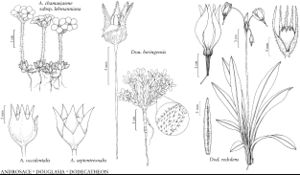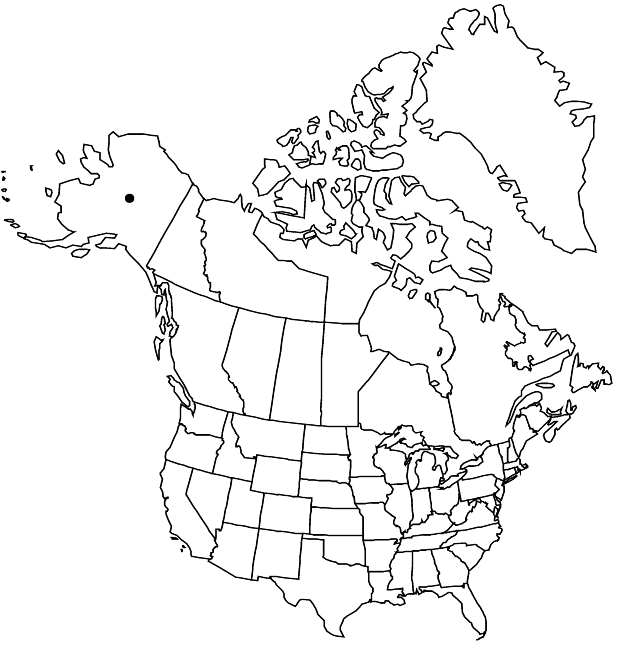Difference between revisions of "Douglasia beringensis"
Novon 4: 381, fig. 1. 1994,.
FNA>Volume Importer |
imported>Volume Importer |
||
| (6 intermediate revisions by 2 users not shown) | |||
| Line 7: | Line 7: | ||
}} | }} | ||
|common_names=Bering dwarf primrose | |common_names=Bering dwarf primrose | ||
| + | |special_status={{Treatment/ID/Special_status | ||
| + | |code=F | ||
| + | |label=Illustrated | ||
| + | }}{{Treatment/ID/Special_status | ||
| + | |code=E | ||
| + | |label=Endemic | ||
| + | }}{{Treatment/ID/Special_status | ||
| + | |code=C | ||
| + | |label=Conservation concern | ||
| + | }} | ||
|basionyms= | |basionyms= | ||
|synonyms= | |synonyms= | ||
| Line 24: | Line 34: | ||
|distribution=Alaska. | |distribution=Alaska. | ||
|discussion=<p>Of conservation concern.</p><!-- | |discussion=<p>Of conservation concern.</p><!-- | ||
| − | --><p>Douglasia beringensis has been found in western Alaska from the Seward Peninsula to the western Alaska Range; a fragmentary collection from the Yukon River in central Alaska is questionable. It differs from other northern species of Douglasia in the pervasive stellate hairs covering all vegetative parts. Douglasia gormanii has sparser forked hairs only on leaves and peduncles, not calyces; plants of D. gormanii also lack the silvery aspect that is characteristic of D. beringensis from its stellate indument.</p> | + | --><p><i>Douglasia beringensis</i> has been found in western Alaska from the Seward Peninsula to the western Alaska Range; a fragmentary collection from the Yukon River in central Alaska is questionable. It differs from other northern species of <i>Douglasia</i> in the pervasive stellate hairs covering all vegetative parts. <i>Douglasia gormanii</i> has sparser forked hairs only on leaves and peduncles, not calyces; plants of <i>D. gormanii</i> also lack the silvery aspect that is characteristic of <i>D. beringensis</i> from its stellate indument.</p> |
|tables= | |tables= | ||
|references= | |references= | ||
| Line 33: | Line 43: | ||
-->{{#Taxon: | -->{{#Taxon: | ||
name=Douglasia beringensis | name=Douglasia beringensis | ||
| − | |||
|authority=S. Kelso | |authority=S. Kelso | ||
|rank=species | |rank=species | ||
| Line 47: | Line 56: | ||
|publication title=Novon | |publication title=Novon | ||
|publication year= | |publication year= | ||
| − | |special status= | + | |special status=Illustrated;Endemic;Conservation concern |
| − | |source xml=https:// | + | |source xml=https://bitbucket.org/aafc-mbb/fna-data-curation/src/2e0870ddd59836b60bcf96646a41e87ea5a5943a/coarse_grained_fna_xml/V8/V8_541.xml |
|genus=Douglasia | |genus=Douglasia | ||
|species=Douglasia beringensis | |species=Douglasia beringensis | ||
Latest revision as of 23:44, 5 November 2020
Plants loosely cespitose cushions or mats, each with branched caudex. Stems prostrate to ascending, with marcescent, imbricate, reddish leaves proximally and terminal, green leaf rosettes. Leaves prominently ascending, thin; blade linear to oblong, 3–10 × 1–1.5 mm, margins entire or toothed, apex obtuse to slightly acute, surfaces densely covered with minute, branched hairs. Scapes 1–10 mm in early anthesis, to ca. 6 cm in fruit, densely hairy, hairs branched and stellate. Inflorescences 1(–2)-flowered, usually bracteate, sometimes ebracteate; bract 1, lanceolate to lanceolate-ovate, 2–3 × 0.5–1 mm, hairy, hairs stellate. Pedicels absent. Flowers: calyx 3–5 × 3–4 mm, densely hairy, hairs minute, stellate and branched; corolla pink, white in age, limb 5–7 mm diam., lobes 2 × 1 mm, margins entire or slightly erose.
Phenology: Flowering early summer.
Habitat: Gravel slopes and outcrops
Elevation: 300-500 m
Discussion
Of conservation concern.
Douglasia beringensis has been found in western Alaska from the Seward Peninsula to the western Alaska Range; a fragmentary collection from the Yukon River in central Alaska is questionable. It differs from other northern species of Douglasia in the pervasive stellate hairs covering all vegetative parts. Douglasia gormanii has sparser forked hairs only on leaves and peduncles, not calyces; plants of D. gormanii also lack the silvery aspect that is characteristic of D. beringensis from its stellate indument.
Selected References
None.

